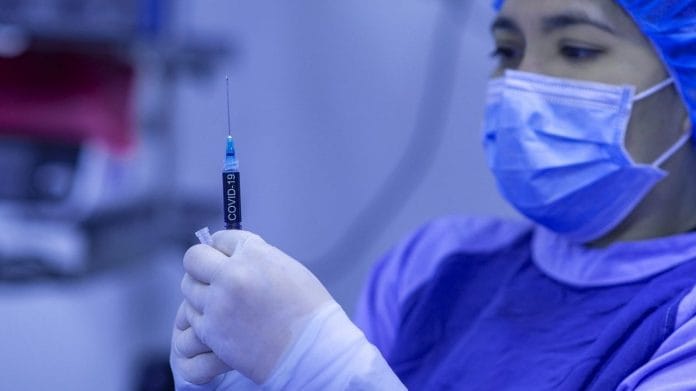London: Drugmakers who designed the first Covid-19 vaccine to gain clearance from Western regulators say they could reset the shot to counter a new strain within just six weeks, if needed.
BioNTech SE Chief Executive Officer Ugur Sahin said he’s confident that the inoculation his company developed with Pfizer Inc. will work just fine against the fast-spreading coronavirus variant that’s raising alarms in the U.K. and beyond. If the current shot fails to be adequately protective, though, the company could tweak it by updating small bits of genetic information called messenger RNA that their vaccine uses.
“The beauty of the messenger RNA technology is that we can directly start to engineer a vaccine, which completely mimics this new mutation,” Sahin said at a press conference Tuesday morning. Moderna Inc. meanwhile indicated that it thought its vaccine would still shield people from the virus and that it was running tests to confirm.
Authorities ranging from the European Medicines Agency to the U.K. government have said there’s no evidence to suggest that the strain, called B.1.1.7, is likely to evade coronavirus vaccines. Most Covid shots target the spike protein that the virus uses to enter cells, and only small changes have been detected in new versions, according to Morgan Stanley analyst David Risinger.
Full immunogenicity
“All the currently identified strains, including B.1.1.7, only carry sporadic point mutations in the spike protein that are believed to be unlikely to disrupt the full spectrum of their immunogenicity,” Risinger said in a note.
Moderna sank 9% in New York, Pfizer fell 1.7%, and BioNTech’s American depositary receipts dropped 5.5%. Moderna has risen more than six-fold since the beginning of the year, while BioNTech’s ADRs have almost tripled.
Countries around the world are restricting travel to and from the U.K. because of concerns about the variant, which officials have said may be up to 70% more transmissible than others. Prime Minister Boris Johnson has put London into lockdown, citing the threat of the strain.pfizer
U.K. authorities have said that while the variant is widespread in London and southeast England, there’s no reason to believe it causes more serious disease than earlier versions. Moncef Slaoui, the chief scientific adviser of Operation Warp Speed, the U.S. Covid vaccine and drug acceleration program, said there’s no hard evidence that it’s more transmissible.
Still, drugmakers are conducting tests to determine how well their shots will defend against new strains. AstraZeneca Plc, the University of Oxford’s partner, said in a statement that it’s investigating the impact of the mutation, and the company doesn’t believe it will hurt its shot’s effectiveness. BioNTech said its tests will take about two weeks. Paris-based Sanofi said it will test its experimental vaccine’s efficacy against any new variant that emerges.
Constant testing
Moderna has tested its vaccine against previous strains and expects that it “would be protective against the variants of the SARS-CoV-2 virus recently described in the U.K.,” according to an emailed statement. “We will be performing additional tests of the vaccine in the coming weeks to confirm this expectation.”
German biotech CureVac NV said it’s constantly testing its experimental Covid-19 shot against different mutations. While it doesn’t think its product will be less effective against the U.K. variant, it also could come up with a new version within six weeks, the company said in an emailed statement.
If companies like BioNTech do need to need to update their vaccines, the most likely scenario is regulators would approve newer versions rather quickly — without another round of large-scale clinical trials, according to Stephen Evans, a professor of pharmaco-epidemiology at the London School of Hygiene & Tropical Medicine. The messenger RNA platform from BioNTech — along with another one from Moderna — has already proved itself to be largely safe, and the review would be analogous to that of annual flu vaccines, he said.
It’s likely that Covid shots will be redesigned in the future to keep them highly effective against new viral strains, Evans said.
Staying in tune
“To me it’s like a motorcar — I tune the engine to get better performance, but in terms of its overall safety, that makes very little difference,” Evans said. “We know that these mRNA vaccines are pretty safe.”
For updates, developers would probably only need to show that their products are raising a comparable immune response, something that could probably be done with fewer than 100 human volunteers, said Peter Openshaw, a professor of experimental medicine at Imperial College London.
“That alone would be enough to allow the new evolution of the vaccine to be licensed,” Openshaw said. “I see absolutely no reason that any regulator would insist that they would have to go right back to square one.”-Bloomberg
Also read: Cipla to experiment with Covid drug remdesivir composition to reduce effect on kidneys






